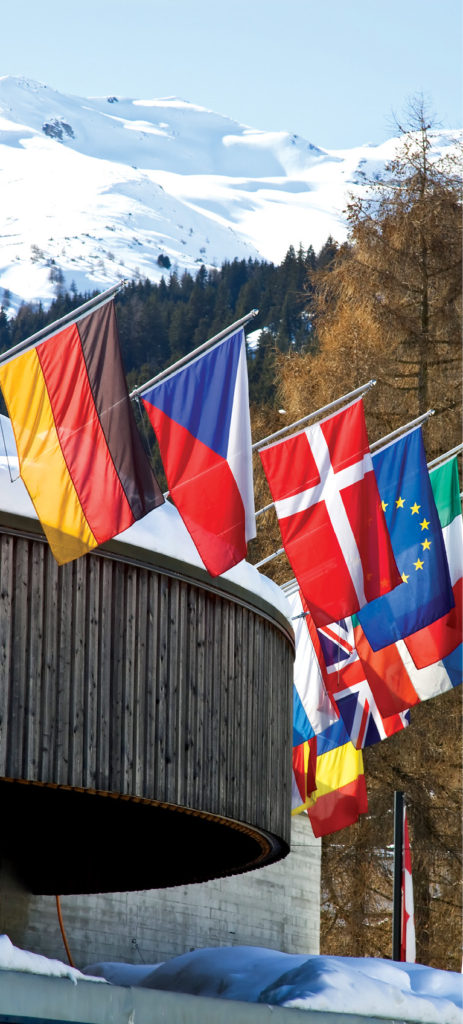Credit the World Economic Forum with saving South Africa from communism.
Invited to attend the 1992 World Economic Forum, Nelson Mandela arrived in Davos armed with a speech written by dogmatic ANC (African National Congress) officials in which the future president was to announce his intention to nationalise the country’s mines, banks, and a great many other industries deemed essential to economic development.
While doing the rounds, Mr Mandela met with government leaders from China and Vietnam, amongst them Chinese Prime Minister Li Peng. Excitedly detailing his plans, Mr Mandela received a reaction he had not foreseen: “Why on earth would you say such silly things,” the Chinese leader reportedly exclaimed. “We are privatising state-owned businesses by the dozen and rolling out the red carpet for investors, trying our level best to attract capitalists. We are a communist government and you are the leader of a liberation movement. Why are you even talking about nationalisation?”
Then again, Mr Mandela had been out of circulation for quite a while and was, as a result, perhaps slightly out of touch with world events. Thankfully, the Davos Summit gave him a reality check. A day after his fateful tête-a-tête with Prime Minister Peng, Mr Mandela addressed the assembled presidents, ministers, billionaires, and other VIPs to announce that his country would be open for business and welcome foreign investors. Years later, Mr Mandela told his official biographer Anthony Sampson that he was given a simple message while in Davos: either keep nationalisation and get no investments, or let go of the idea and receive untold billions.
Thus South Africa became the first country to benefit from what much later became known as the Clinton Doctrine: a strategy for the enlargement of the free world through a process of economic inclusion. The foundations of that policy were laid in Davos where in 1994 Director-General Peter Sutherland of the General Agreement on Tariffs and Trade – GATT, the forerunner of the World Trade Organisation (WTO) founded in 1995 – delivered a landmark speech in which he called for the establishment of a new high-level forum for international economic cooperation that would include the major emerging markets.
In Davos, Mr Sutherland argued that the world’s balance of power had shifted with the emergence of new regional behemoths such as China, India, Nigeria, and Brazil. As a result, global economic management could no longer be the exclusive domain of the Group of Seven (G7) – the forum of major advanced economies (US, UK, France, Italy, Germany, Canada, and Japan) which until then had steered world events. In 1999, the G20 was duly formed with the aim of bringing together “systemically important” industrialised and developing countries to discuss key issues in the global economy.
Multipolar World
 As an informal gathering of leaders – government, corporate, civil, or otherwise – Davos not only played a central role in the emergence of a new multipolar world order; the annual event also sets its agenda. In 1995, the UN-backed Commission on Global Governance chose the World Economic Forum as the venue for the presentation of its Our Global Neighbourhood Report. Now largely forgotten, this document made the case for a strengthening of the United Nations as a promotor of governance standards.
As an informal gathering of leaders – government, corporate, civil, or otherwise – Davos not only played a central role in the emergence of a new multipolar world order; the annual event also sets its agenda. In 1995, the UN-backed Commission on Global Governance chose the World Economic Forum as the venue for the presentation of its Our Global Neighbourhood Report. Now largely forgotten, this document made the case for a strengthening of the United Nations as a promotor of governance standards.
The commission, co-chaired by Swedish Prime Minister Ingvar Carlsson and former Commonwealth Secretary-General Shridath Ramphal, concluded that as nations become more interdependent through increased economic cooperation and trade, issues of governance also become more important and need a codified structure – or a set of benchmarks – against which to measure individual and collective performance.
Addressing the Davos Summit over a satellite link, US President Bill Clinton assured the participants that he would throw his country’s weight behind the push towards this new global economic architecture. Governance soon became a buzzword, not necessarily denoting administrative competence, but rather adherence to a basic set of policies generally deemed sensible: free markets, free trade, well-defined universal rules, and democracy – or a semblance thereof.
It was in the relaxed atmosphere of an Alpine resort town – as opposed to the high-octane mix of intrigue, power play, and diplomacy prevalent at UN headquarters in New York – that a global consensus emerged around the way forward. This led US political scientist Samuel Huntington (1927-2008) to coin the term Davos Man in 1997. “This man,” Mr Huntington wrote, “has little need for national loyalty and sees national boundaries as obstacles that are thankfully vanishing.” Mr Huntington was, however, not altogether pleased with the Davos Class and warned that it apparently considered national governments as “residues from a past era whose only function is to facilitate the elite’s global operations.”
The Davos Class leveraged the Clinton Doctrine and the consensus on governance to further the neoliberal economic agenda with remarkable results. The world economy boomed and each year untold millions were lifted out of poverty as nations in Asia, Africa, and Latin America embarked on a path of accelerated development and recessions became but short-lived blips on the screens of traders the world over. Some pundits, amongst them even a few respectable ones, went so far as to predict that the triumph of the neoliberal model had relegated economic downturns to the dustbin of history – henceforward, the only way was up.
However, the laws of nature state that everything that goes up, must eventually come back down. That moment came in 2008 when the financial house of cards, so carefully assembled, crashed. Rescued at the eleventh hour from extinction, governments were called back to the fore to clear the decks and save the global financial system from meltdown. At the 2009 Davos meeting, Klaus Schwab, founder of the World Economic Forum, summarised the events of the year before: “The pendulum has swung and power has moved back to governments.”
Party Over
Down but not out, bankers toned down their presence in Davos and cancelled the extravagant parties they had hosted in previous years. Instead, more civilised soirees were organised to entertain politicians and gauge their mood. The talk was all about the outsized bonuses incompetent bankers pocketed and the idea, first floated by Bank of England Governor Mervyn King, to cut up too-big-to-fail banks into bite-sized portions.
It took just two years for the Davos Class to reassert its position at the top of the food chain. Already in 2010, the bankers, with corporate leaders in tow, returned in force to Davos to remind politicians of the dangers of pestering financial markets with undesired reforms. During the 2010 WEF summit, Bloomberg newswire reported on a private meeting at which representatives of the world’s largest thirty banks plotted ways to regain their say in global economic affairs.
Only one of the participants was coaxed into shedding a light on the secretive get-together. Bank of America CEO Brian Moynihan assured that he and his fellow bankers had only tried to become “more engaged” and were in full agreement that additional regulation was inevitable and perhaps even desirable. Mr Moynihan said that the banks preferred these new rules to be channelled through the G20 – the main global forum on issues of governance and cooperation. What Mr Moynihan conveniently failed to mention was that the G20 remained a paper tiger whose take on governance did not include guidelines for the proper management of financial institutions.
The Chosen Few
Whereas the financial crisis that erupted in 2008 made rallying against corporate elites supremely fashionable and mainstream, protesters often ignore the fact that human society will always produce a privileged few who call the shots. The best one can aim for is a mechanism of checks and balances to keep the powers-that-be from abusing their authority. Since so far no-one has come up with a form of anarchy that actually produces anything besides utter chaos, elites seem a necessary evil to furthering the cause of humankind.
The World Economic Forum – now no longer confined to economics only – offers this elite an opportunity to come together in a non-confrontational setting. They are not expected to produce any statements, sign deals, or negotiate agreements. In fact, nothing is expected of those who attend the WEF. Participants are invited to mingle, chat, and swap ideas and experiences. There is no such thing as a failed Davos Summit.
More open than the Bilderberg Group and much less antagonistic than even the tamest of United Nations’ conferences, the unpretentious World Economic Forum has grown into the premier event for all those who occupy positions of power and feel a need to commiserate with their peers.
While the Davos Class indeed rules the world, not all emanating from the Swiss Alpine resort town is evil. The WEF brought Israelis and Palestinians closer together with Shimon Peres and Yasser Arafat walking onto the stage holding hands in 1994; helped South Africa become a world power; put governance on the global agenda; pioneered the push towards a green economy; and helped emerging countries gain a say in world affairs.
While the WEF could drop the “economic” from its name to better convey its nature, the event is without equal and indispensable as a place where, at least until recently, grandstanding by attendees was frowned upon. Davos has also shown that off-stage and out of the limelight, most leaders – and that includes captains of industry – turn out to be reasonable people willing to iron out differences and reach amicable agreements that ultimately address some of the world’s most pressing problems and help identify areas of future concern. If there is any danger, it is of Davos becoming overhyped and the very thing it set out not to be: a soapbox with a worldview for leaders to climb onto in order to be seen, heard, admired, and reviled. For that, we already have the United Nations.





























